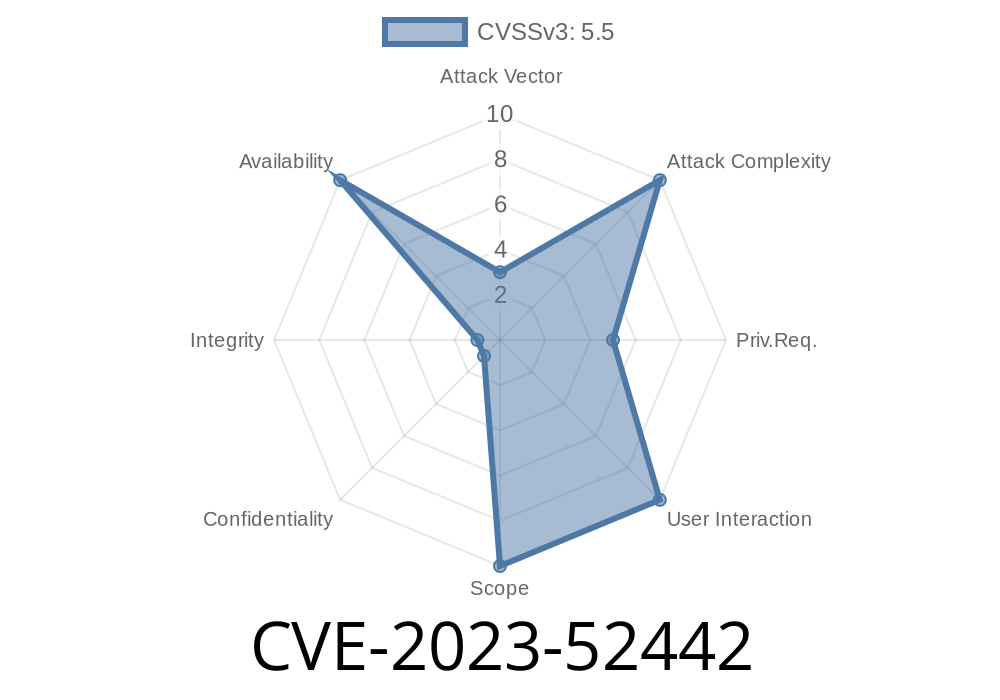In early 2024, security teams resolved a serious bug in the Linux kernel’s ksmbd server, tracked as CVE-2023-52442. This vulnerability opened the door for attackers to mess with SMB (Server Message Block) sessions by bypassing session and tree id validation, potentially leading to unauthorized access to file shares. In this post, I’ll break down what happened, show you how it worked (with code), and give you the links and resources to keep your systems safe.
What is ksmbd and Why Should I Care?
ksmbd is a kernel-space SMB3 server for Linux. It allows Windows and Linux systems to easily share files. Since it operates within the kernel—and handles user authentication and shares—any bug here is high impact.
What Happened?
When processing SMB2 compound requests (several SMB operations packed into one message), ksmbd used smb2_get_msg() in two spots:
smb2_check_user_session()
But smb2_get_msg() always got the header from the first request, not necessarily the one being processed. If that first request was a TREE_CONNECT command, the tree id check would get bogus data () and skip validation for the whole sequence!
Why does this matter?
Tree IDs and session IDs are how SMB authenticates and links requests to users and shares. Skipping these checks opens the door for attackers to hijack connections, run commands as others, or access forbidden resources.
Here’s a simplified (annotated) code snippet that shows the vulnerable logic
// Vulnerable: Always returns header from first compound request
struct smb2_hdr *hdr = smb2_get_msg(req_buf);
// tree_id check is skipped if not properly validated!
if (hdr->Command == SMB2_TREE_CONNECT_HE) {
// skipped: tree id validation is not triggered
}
// ... rest of the code
The Fix
The patch switched from smb2_get_msg() to ksmbd_req_buf_next(), which correctly finds the current command in the compound request instead of always looking at the first:
// Fixed: Gets header for the currently processed compound request
struct smb2_hdr *hdr = ksmbd_req_buf_next(req_buf, command_index);
// Now, tree_id and session_id are properly validated for each command
validate_tree_id(hdr->TreeId);
validate_session_id(hdr->SessionId);
Exploit Scenario (How Could an Attacker Abuse This?)
1. Craft a Compound SMB2 Request: Attacker prepares a SMB2 message with TREE_CONNECT as the first command and malicious/desynced session & tree IDs in the following commands.
2. Send to Vulnerable ksmbd Host: Upon receipt, due to the bug, only the first command’s tree/session info is checked—other operations get through without real verification!
Hijack Session / Access Data: Now, the attacker might
- Execute SMB commands as another user/session.
Here’s a Python-style sketch showing the core idea (not an actual exploit)
# Pseudo-code for a bad SMB2 compound sequence
compound_req = [
create_command('TREE_CONNECT', tree_id=, session_id=), # First command
create_command('CREATE', tree_id=1234, session_id=9999), # Forged IDs (should not be allowed)
]
# Sent as a single SMB2 packet to ksmbd server
send_smb2(compound_req)
# On vulnerable server, the 'CREATE' operation sneaks by without proper session/tree validation.
Upstream Patch:
ksmbd: validate session id and tree id in compound request (kernel.org)
Main Announcements:
NVD entry for CVE-2023-52442
ksmbd Project
Bug Discussion:
Conclusion
CVE-2023-52442 is a sneaky but potentially damaging flaw in Linux’s ksmbd server. If you host SMB shares on Linux through ksmbd, patch now. Even if you’re on an internal network, this is the kind of bug that insiders or malware can abuse.
Always validate session and tree IDs—don’t trust the first message!
*Feel free to copy and share this explanation! Let’s keep our Linux boxes safe from petty SMB tricks.*
Further Reading
1. Linux kernel commits for ksmbd
2. ksmbd documentation
3. Samba vs ksmbd explained
Got questions or want to see a full PoC?
Comment below or reach out!
Timeline
Published on: 02/21/2024 08:15:45 UTC
Last modified on: 12/12/2024 15:31:43 UTC
